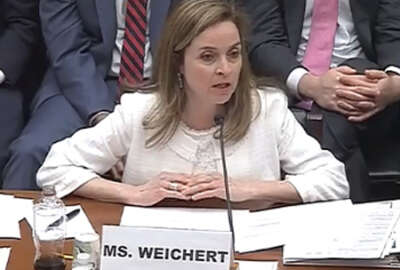Agencies get new workforce priorities to focus on for next few years
In today's Federal Newscast, the Office of Personnel Management released a new federal workforce plan.
To listen to the Federal Newscast on your phone or mobile device, subscribe in PodcastOne or Apple Podcasts. The best listening experience on desktop can be found using Chrome, Firefox or Safari.
- Agencies have to pick two out of four new workforce priorities to focus on over the next four years. Some of the primary areas include modernizing information technology, enhancing workforce diversity and improving recruitment practices. The Office of Personnel Management released a new federal workforce plan yesterday. Along with four priorities, it detailed four enabling priorities, which agencies can use to support their areas of focus. These enabling priorities are designed to support Biden administration initiatives, such as rebuilding the federal workforce. The primary goals for agencies will remain in place until 2026.
- The White House’s Office of the National Cyber Director filled out its leadership ranks. Kemba Walden will be the first principal deputy national cyber director. She most recently was an assistant general counsel in Microsoft’s Digital Crimes Unit. The White House also named Neal Higgins as deputy national cyber director for national cybersecurity, and Rob Knake as deputy national cyber director for strategy and budget. Higgins joined the office from the CIA, where he was associate deputy director for digital innovation. Knake was most recently a senior fellow at the Council on Foreign Relations.
- Agencies are trying to manage extensions for federal grants after seeing some issues during COVID-19. The extensions are necessary because some of the work from grants awarded in 2020 was unable to be completed due to the pandemic. The Education Department is working to carry over some of those grants and extend them for another six to twelve months. David Downey, a management analyst at Education’s Office of Finance and Operations, said at an ACT-IAC event that the office will continue to work with and monitor the effectiveness of grantees.
- A bill requiring regular updates on agencies’ performance goals is coming into focus. Senate Homeland Security and Governmental Affairs Committee Chairman Gary Peters (D-Mich.) and Sen. Mike Braun (R-Ind.) introduced the Federal Performance Accountability Act. The bill tasks the Office of Management and Budget with tracking how much progress agencies are making under their strategic plans. The bill also requires agencies to post more data tracking their progress on Performance.gov. The bill, if passed, would be the first update to the Government Performance and Results Act in more than 10 years.
- The Federal Emergency Management Agency would have to improve its data collection under a new bill in Congress. House Homeland Security Committee Chairman Bennie Thompson (D-Miss.) introduced the FEMA Equity Act last week. It would direct the agency to better identify inequities within its programs, including barriers to access and disparate outcomes. The goal is to ensure low income communities and communities of color aren’t left behind when it comes to federal disaster response efforts.
- The Biden administration wants agencies to take equity into consideration for new policies or programs. But federal leaders are trying to figure out what that means for their agencies. The Center for Medicare and Medicaid Innovation at the Department of Health and Human Services defines equity as “the attainment of the highest level of health for all people.” To make this a reality, The Center wants better data collection for by race, ethnicity, language, geography, and disability. With this data, the Center hopes it can spot gaps in health care. Federal health leaders also want to use more automation or machine learning to extract data. (Federal News Network)
- The Biden administration is also taking steps to ensure infrastructure spending projects remain on time and on budget. The administration is looking to accelerate the pace of federal permitting and environmental reviews for thousands of infrastructure projects under the $1 trillion Bipartisan Infrastructure Law. The White House is releasing a permitting action plan outlining ways agencies can expedite these processes. The administration stood up a Federal Permitting Dashboard tracking progress on projects funded through the spending bill. Projects range from airport improvements to port upgrades to Superfund cleanup sites. More than 4,300 projects have been announced so far. More than 90% of the funds will be spent by non-federal partners. (Federal News Network)
- The Defense Department’s inspector general said the process DoD used to decide the new home of U.S. Space Command was “reasonable.” Members of Congress asked the IG to look into the basing process, claiming the Trump administration’s decision to locate the command’s headquarters in Huntsville, Alabama, was affected by improper political influence. The IG didn’t find any violations of law or policy, but did make several recommendations to improve the basing decision process.
- Last year, Congress established a basic needs allowance for service members living below the poverty line. Now advocates are giving the Pentagon advice on how to implement it. The basic needs allowance will give a supplementary income to service members who are food insecure. A group of military family advocacy groups say the Defense Department should expand the benefit to as many families as possible now that it is codified into law. In a letter to Defense Secretary Lloyd Austin, the advocates from the National Military Family Association and other groups say DoD should also collect information on food insecurity to understand military hunger. The advocates also want the Pentagon to establish an advisory board to oversee the implementation of the program.
- Nearly a dozen families who sued the Army’s privatized housing provider at Fort Meade, Maryland, over poor living conditions have settled their case. Documents filed in federal court this week say the tenants reached a confidential settlement with Corvias Management. The families first filed suit two-and-a-half years ago, claiming their on-base homes were plagued by mold and other unsafe conditions.
- The Defense Department is restructuring its research and engineering office. The organization only came into existence a few years ago after Congress felt the Pentagon needed to split its acquisition office in order to focus more on experimentation and science. The reorganization will re-designate the office’s three directors as deputy chief technology officers. They will oversee science and technology, critical technologies and mission capabilities.
- The Army is planning as many as four contracts to implement its Unified Network Operations strategy. Over the next two years, the Army will finalize its acquisition strategy to create a unified network. Matt Maier, the project manager for Interoperability, Integration and Services for the Army’s PEO Command, Control, Communications Tactical (C3T) said a new request for information is coming out this month. The information PEO-C3T collects from that notice and previous ones will help inform solicitations for as many as four programs to implement the Army’s Unified Network Operations strategy. The Army plans to issue the first solicitation for low tier communications like radios in mid-2023 with an award expected in early 2024.
- The awards under the Department of Homeland Security’s First Source 3 contract might take a little bit longer. DHS alerted industry that it still is working through the phase 1 evaluations. That will lead to a downselect of companies who qualify for phase 2 of this small business IT products contract that has a $10 billion ceiling. DHS said the number of proposals, which totaled more than 600, is the reason why phase one is taking so long. DHS said in November it plans to make final awards by August.
Copyright © 2025 Federal News Network. All rights reserved. This website is not intended for users located within the European Economic Area.
Eric White
Eric White is news anchor and Federal Drive producer at Federal News Network.
Follow @FEDERALNEWSCAST
Related Stories
OMB sets workforce, customer experience targets for agency teams carrying out PMA goals
Questions arise from Air Force’s decision to move Space Command headquarters to Alabama
Related Topics
All News
Army Unified Network
Biden administration
bipartisan infrastructure bill
Department of Homeland Security
diversity equity inclusion and accessibility
Education Department
Federal Drive
federal infrastructure
Federal Newscast
FEMA
First Source
food insecurity
grants
grants management
infrastructure
Kemba Walden
Management
military families
military housing
Office of Personnel Management
PEO-C3T
Performance.gov
privatized military housing
Space Command
substandard military housing
Tom Temin
Workforce
workforce priorities






